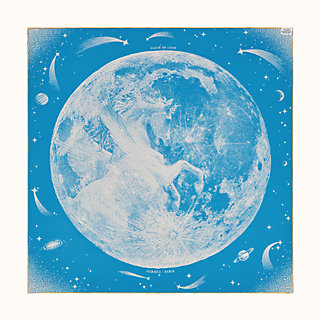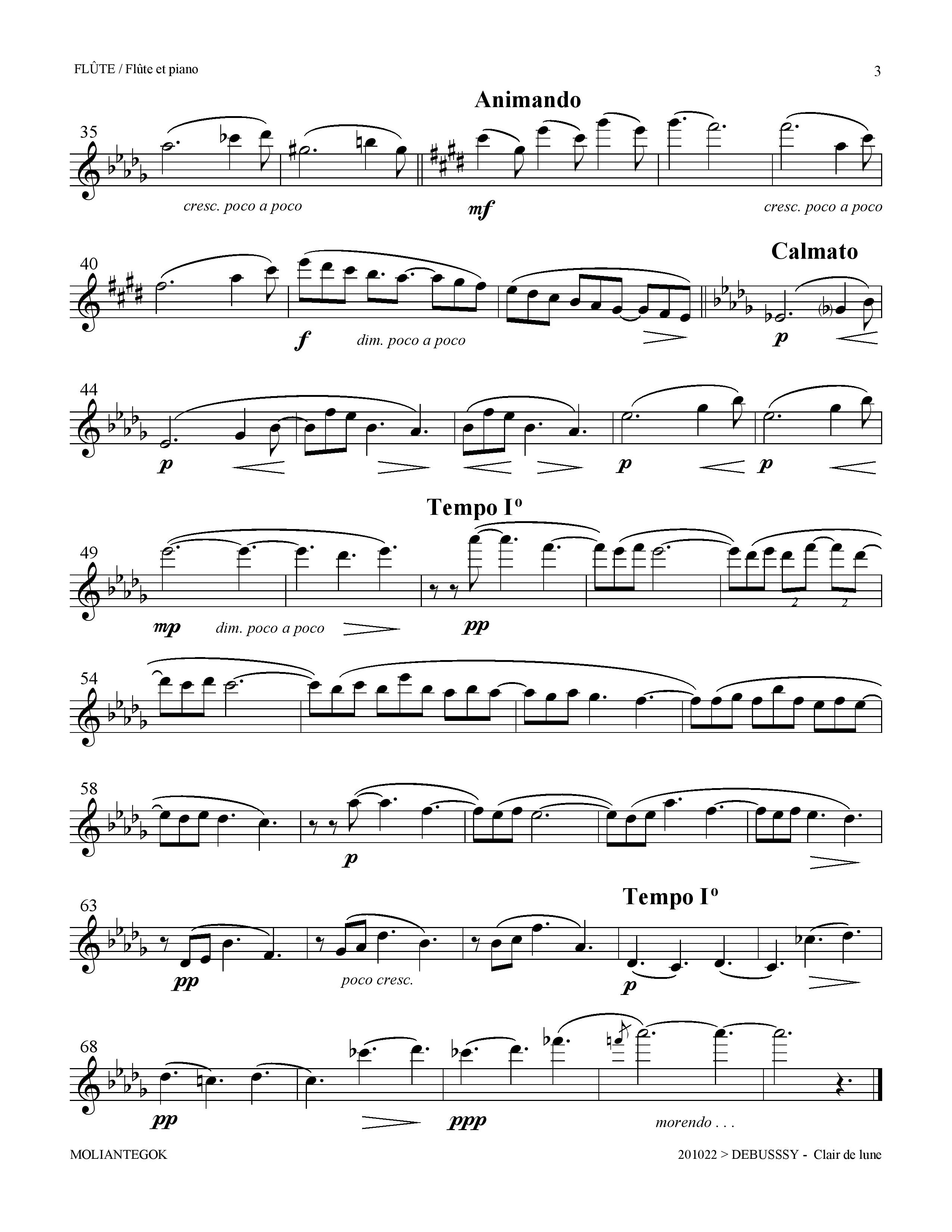'Clair de Lune' is actually the third and most famous movement of Claude Debussy's 'Suite Bergamasque.' Although Debussy wrote the piece in 1890 at the age of 25, it was not published until 1905. By that time it had been partially re-written as well as re-titled. The original name of this piece was 'Promenade Sentimentale.' Claude Debussy (1862-1918) composed Clair de Lune, the third movement from the Suite Bergamasque in 1888 (first published in 1903). It is important to note that with the exception of the poetically titled Clair de Lune, suite Bergamasque is created exclusively from Baroque movements. The third and most famous movement of Suite Bergamasque by Claude Debussy is Clair de lune. It is written in 9/8 meter and marked Andante, very expressive. Its title, which means moonlight in French, is taken from Verlaine's poem Clair de lune. Here an excerpt from Verlaine's poem that inspired Debussy's piece: Your soul is a select landscape. Home Shop NEW ARRIVALS DRESSES TOPS BOTTOMS JUMPSUITS, ROMPERS, & SETS. The Clair De Lune Bedside Crib is a very stylish, modern Bedside Crib that is beautifully made. Keeping with the tradition of the Moses basket, but giving it a stylish makeover it's size and weight make it easy to move around the house.
- Clair De Lune
- Clair De Lune Lyrics
- Clair De Lune Translation
- Clair De Lune In Movies
- Clair De Lune Meaning
The poem Clair de lune (Moonlight) is from Paul Verlaine’s collection of poems “Fetes Galantes” dating back to 1869. The French poet was associated with the Symbolist Movement; and the poem is a mixture of Romance and Impressionism.
Clair De Lune

BY PAUL VERLAINE
Clair De Lune
Your soul is as a moonlit landscape fair,
Peopled with maskers delicate and dim,
That play on lutes and dance and have an air
Of being sad in their fantastic trim.
The while they celebrate in minor strain
Triumphant love, effective enterprise,
They have an air of knowing all is vain,—
And through the quiet moonlight their songs rise,
The melancholy moonlight, sweet and lone,
That makes to dream the birds upon the tree,
And in their polished basins of white stone
The fountains tall to sob with ecstasy.
~~ ORIGINAL FRENCH ~~

Votre âme est un paysage choisi
Que vont charmant masques et bergamasques
Jouant du luth et dansant et quasi
Tristes sous leurs déguisements fantasques.
Tout en chantant sur le mode mineur
L’amour vainqueur et la vie opportune
Ils n’ont pas l’air de croire à leur bonheur
Et leur chanson se mêle au clair de lune,
Au calme clair de lune triste et beau,
Qui fait rêver les oiseaux dans les arbres
Et sangloter d’extase les jets d’eau,
Les grands jets d’eau sveltes parmi les marbres.
Analysis of Verlaine’s “Clair de Lune”
The poem Claire de lune by Paul Verlaine consists of three stanzas where the poet takes the readers through a journey where he gets in touch with his soul, with the hopes of finding himself. Translated to English, the name of the poem means “Moonlight”. The poet does an intense soul searching under the moonlight where the poet has created another superficial universe for himself where he associates his soul to a picturesque landscape. He invites all kinds of distractions to feed to his soul in the form of masquerades, singing, and dancing. The poet talks about his imaginative distractions, especially in lines 2-4, where he mentions “playing the lute”, and being “sad beneath their fanciful costume”.
In the second stanza the poet dedicates the whole stanza to ease his soul with the sound of melody. The lines “singing together in a minor key”, “and their song melts into the lunar beam” reflect his soul connecting his imaginations under the moonlight with his aching for melody.
The third stanza portrays the poet acknowledging the picturesque beauty of the moonlight. The poet uses the adjectives “sad and beautiful” to describe the enchanting moon and its alluring beam of light that lulls the birds in the trees to the land of dreams. The poem signifies what the moonlight means to the poet and how his soul is connected to it. To him, the moonlight even comes down the jets of fountains, the jets that soothe and ease the marbles underneath the surface.
The poem has been initially translated from French into English, hence the analysis of the lines has been jotted down according to its meaning in English language.
'Clair de lune' (English 'Moonlight') is a poem written by French poet Paul Verlaine in 1869. It is the inspiration for the third and most famous movement of Claude Debussy's 1890 Suite bergamasque. Debussy also made two settings of the poem for voice and piano accompaniment. The poem has also been set to music by Gabriel Fauré, Louis Vierne and Josef Szulc.
Text[edit]

Clair De Lune Lyrics
_-_Clair_de_lune_(2359563640).jpg/1200px-Joseph_Vernet_(1714-1789)_-_Clair_de_lune_(2359563640).jpg)
BY PAUL VERLAINE
Clair De Lune
Your soul is as a moonlit landscape fair,
Peopled with maskers delicate and dim,
That play on lutes and dance and have an air
Of being sad in their fantastic trim.
The while they celebrate in minor strain
Triumphant love, effective enterprise,
They have an air of knowing all is vain,—
And through the quiet moonlight their songs rise,
The melancholy moonlight, sweet and lone,
That makes to dream the birds upon the tree,
And in their polished basins of white stone
The fountains tall to sob with ecstasy.
~~ ORIGINAL FRENCH ~~
Votre âme est un paysage choisi
Que vont charmant masques et bergamasques
Jouant du luth et dansant et quasi
Tristes sous leurs déguisements fantasques.
Tout en chantant sur le mode mineur
L’amour vainqueur et la vie opportune
Ils n’ont pas l’air de croire à leur bonheur
Et leur chanson se mêle au clair de lune,
Au calme clair de lune triste et beau,
Qui fait rêver les oiseaux dans les arbres
Et sangloter d’extase les jets d’eau,
Les grands jets d’eau sveltes parmi les marbres.
Analysis of Verlaine’s “Clair de Lune”
The poem Claire de lune by Paul Verlaine consists of three stanzas where the poet takes the readers through a journey where he gets in touch with his soul, with the hopes of finding himself. Translated to English, the name of the poem means “Moonlight”. The poet does an intense soul searching under the moonlight where the poet has created another superficial universe for himself where he associates his soul to a picturesque landscape. He invites all kinds of distractions to feed to his soul in the form of masquerades, singing, and dancing. The poet talks about his imaginative distractions, especially in lines 2-4, where he mentions “playing the lute”, and being “sad beneath their fanciful costume”.
In the second stanza the poet dedicates the whole stanza to ease his soul with the sound of melody. The lines “singing together in a minor key”, “and their song melts into the lunar beam” reflect his soul connecting his imaginations under the moonlight with his aching for melody.
The third stanza portrays the poet acknowledging the picturesque beauty of the moonlight. The poet uses the adjectives “sad and beautiful” to describe the enchanting moon and its alluring beam of light that lulls the birds in the trees to the land of dreams. The poem signifies what the moonlight means to the poet and how his soul is connected to it. To him, the moonlight even comes down the jets of fountains, the jets that soothe and ease the marbles underneath the surface.
The poem has been initially translated from French into English, hence the analysis of the lines has been jotted down according to its meaning in English language.
'Clair de lune' (English 'Moonlight') is a poem written by French poet Paul Verlaine in 1869. It is the inspiration for the third and most famous movement of Claude Debussy's 1890 Suite bergamasque. Debussy also made two settings of the poem for voice and piano accompaniment. The poem has also been set to music by Gabriel Fauré, Louis Vierne and Josef Szulc.
Text[edit]
Clair De Lune Lyrics
Clair De Lune Translation
Votre âme est un paysage choisi
Que vont charmant masques et bergamasques
Jouant du luth et dansant et quasi
Tristes sous leurs déguisements fantasques.
Tout en chantant sur le mode mineur
L'amour vainqueur et la vie opportune
Ils n'ont pas l'air de croire à leur bonheur
Et leur chanson se mêle au clair de lune,
Au calme clair de lune triste et beau,
Qui fait rêver les oiseaux dans les arbres
Et sangloter d'extase les jets d'eau,
Les grands jets d'eau sveltes parmi les marbres.[1]
Clair De Lune In Movies
Your soul is a chosen landscape
Where charming masquerades and dancers are promenading,
Playing the lute and dancing, and almost
Sad beneath their fantastic disguises.
While singing in a minor key
Of victorious love, and the pleasant life
They seem not to believe in their own happiness
And their song blends with the light of the moon,
With the sad and beautiful light of the moon,
Which sets the birds in the trees dreaming,
And makes the fountains sob with ecstasy,
The slender water streams among the marble statues.
References[edit]
Clair De Lune Meaning
- ^'Excerpt, One Hundred and One Poems by Paul Verlaine, a bilingual edition, translated by Norman R. Shapiro (1998)'. www.press.uchicago.edu. Retrieved 2017-07-08.
External links[edit]
- French Wikisource has original text related to this article: Fêtes galantes/Clair de lune
